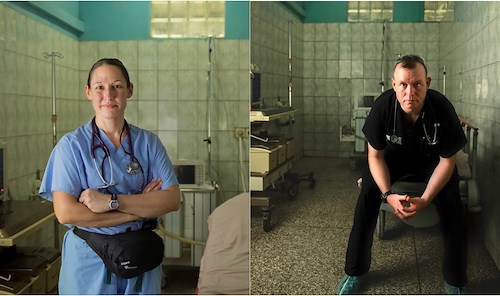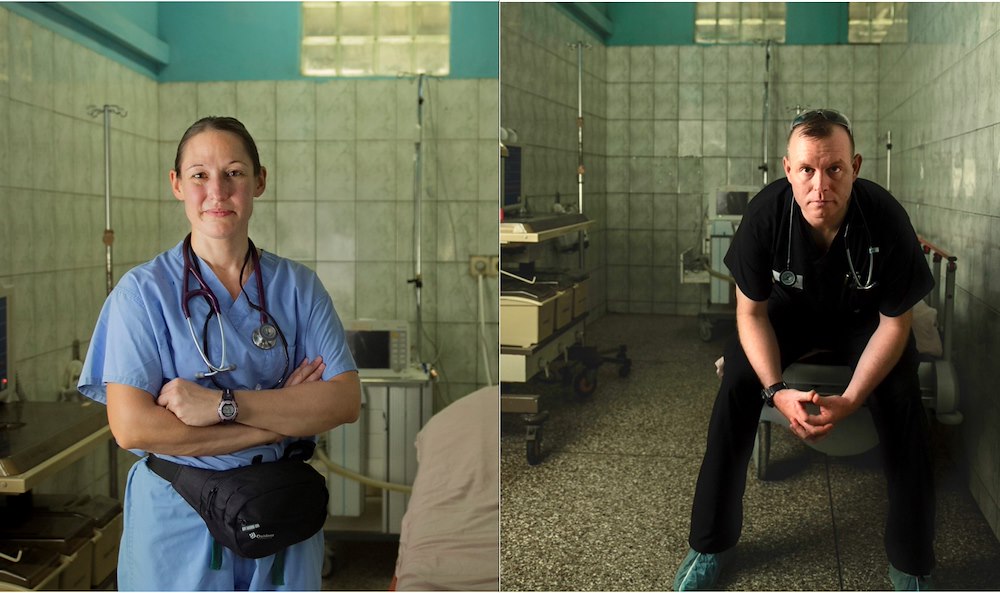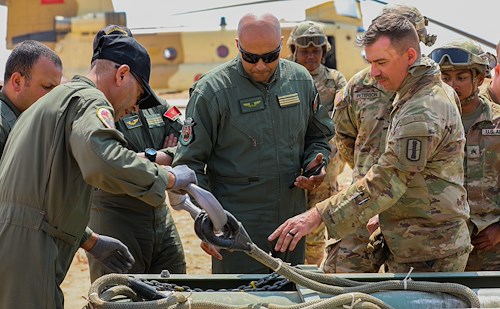Gallery contains 1 image
×
Photo 1 of 1
‘He’ll meet his demise:’ US Army physician speaks about dying African patient
ACCRA, Ghana -- Every breath is a battle. Subtle wheezing from his windpipe serves as a siren song despite the noise pollution generated by an overcrowded hospital clinic. Three frail fingers stretch toward the ceiling. Only he knows if it’s a cry for water or his final prayer.
Photo by: Capt. James Sheehan
ACCRA, Ghana -- Every breath is a battle. Subtle wheezing from his windpipe serves as a siren song despite the noise pollution generated by an overcrowded hospital clinic. Three frail fingers stretch toward the ceiling. Only he knows if it’s a cry for water or his final prayer.
Sweat glistens from his forehead to his chin. An olive-green plastic neck brace restricts. No mobility. No way to communicate. Doctors and nurses hope he understands his mortal fate with nonverbal cues and compassionate eye contact. Bedside manner is paramount.
“Unfortunately, this man behind me will meet his demise,” confided U.S. Army Reserve Capt. Michael Barton, physician with the 75th Combat Support Hospital out of Tuscaloosa, Alabama. “He’s suffered a brain hemorrhage about 12 hours ago after a fall. It’s heartbreaking, but after 12 hours and no definitive plan for a craniotomy, there isn’t much we can do.”
Barton is part of U.S. Army Africa’s three-week medical readiness training exercise at the 37th Military Hospital. Although an added benefit, he’s not in Accra on a humanitarian mission to treat underprivileged patients. Barton is here to operate in an environment foreign to his team.
“The next war won’t have the luxuries we are used from a hospital back in the U.S.,” explained Barton. “We may be operating with only a table, tent, stethoscope and my two hands.”
Intercontinental differences stretch beyond the operating table. Hospital patients in Ghana, including trauma, must be identified prior to receiving treatment. Medical care is funded upfront. Patients or their families are instructed to shop at a nearby medical supply store to purchase recommended materials from bed sheets to Band-Aids. Except for extreme and rare circumstances, citizens aren’t necessarily entitled or afforded emergency, life-saving care without adequate compensation.
“There is no such thing as the ‘golden hour,’” said Barton.
Because of the overwhelming financial and administrative requirements, Ghanaian locals sometimes opt to hold-off a hospital visit until reaching critical mass. This dilemma generates medical conditions unique to the area and prolonged, forward-deployed combat situations.
Untreated conditions give U.S. Army surgeons and medical professionals an opportunity to witness and treat complicated injuries and illnesses. U.S. medical professionals would be surprised to see the survivability of the human body, in Barton's opinion.
“You’ve heard of flesh-eating bacteria?” asked Barton. “In the U.S., we typically see stage one or the beginning of the condition. When untreated, necrotizing fasciitis quickly spreads eroding skin.”
“We saw a patient come in with flesh-eating bacteria from her toe to her knee. We lifted her pant leg and saw black skin and maggots. She had to be suffering for a few days. It’s terrible. It’s tragic. We wouldn’t normally see it that advanced in the states but maybe we would in conventional warfare. Hopefully, my team and I can learn from it and help save future patients,” added Barton.
Untreated conditions aren’t the only lessons the team is learning. Ghanaian doctors, nurses and medical staff are world-class professionals, according to Barton.
“Academically, Ghanaian doctors are sound. They can quote textbooks on any case we’ve encountered,” Barton said. “They are some of the most compassionate people I’ve worked with. They take their care personally.”
On paper, the exercise objectives are building partnerships, improving readiness and enhancing fundamentals. But according to Barton, they give young soldiers an opportunity unlike anything else.
"I volunteered to come back. I love it here, I've learned so much," said U.S. Army Capt. Annie Gerhardt, family nurse practitioner serving in the North Dakota National Guard. This is Gerhardt's second MEDRETE in Ghana.
"People in Ghana have a compassion for their neighbor you don't see too often," Gerhardt said in regards to an unusual process practiced here.
When an accident occurs, the individual responsible is required to fund the medical bills and escort the effected party. For example, if you run a red light and hit a car injuring a driver, you escort the injured driver to the hospital. The doctor recommends supplies and gives you a cost estimate. You buy the supplies and satisfy all associated costs.
According to Gerhardt, Ghanaians honor this system with minimal enforcement.
"Ghanaians have a sense of duty. The responsible party almost always shows up. I once saw two patients come in from a fist fight altercation," Gerhardt explained. "No kidding, a man punch another man in the jaw. Since he inflicted the worst injury, he came and paid the bill. I asked if they were friends. The man said 'we are not friends, but this is my responsibility.'"
Ghanaians learn U.S. medical tactics. U.S. learn Ghanaian medical tactics. They both learn strengths and weaknesses for hospital administration, logistics and wait-time processes. They learn how to operate with less. They learn how world-class doctors operate with less.
They learn how fundamental cultural norms can determine biological strength, survivability and quality of life. They learn compassion is universal.








